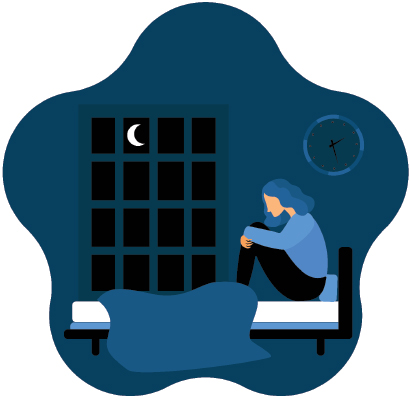Insomnia is a persistent sleep disorder that affects nearly 60% of people with cancer, diminishing their quality of life.1,2 Chronic insomnia disorder is defined by trouble falling asleep, staying asleep, or waking too early three times per week for 3 months or more.3 Standard care comprises pharmacologic treatment, which is not always effective. Moreover, adverse effects—such as continued sleep difficulty, memory disturbances, and falls—are commonly associated with sleep medications.4 Additionally, insomnia may increase the risk of infections,5 as well as exacerbate pain, fatigue, and psychological distress.6 Consequently, many patients prefer nonpharmaceutical treatment options.4,7

Jun J. Mao, MD, MSCE

Christina Seluzicki, MBE
Integrative oncology combines evidence-based complementary therapies with conventional cancer care to address the symptoms associated with cancer and its treatments.8,9 Cognitive behavioral therapy for insomnia (CBT-I) and acupuncture are two such approaches that have been used for managing insomnia.
CBT-I is a behavioral intervention specially designed to address insomnia through sleep restriction, stimulus control, cognitive restructuring, relaxation training, and education.10 Sleep restriction induces mild sleep deprivation by limiting time spent in bed to actual sleep; stimulus control focuses on strengthening behaviors that associate the bed with sleep; and cognitive restructuring aims to manage anxiety related to sleep. Relaxation training focuses on reducing thoughts and physical tension that hinder sleep, and education training involves teaching patients about behaviors for healthy sleep.
Clinical data indicate that CBT-I is highly effective in cancer survivors.11 The American College of Physicians and the American Academy of Sleep Medicine both recommend it as the first-line treatment for insomnia.12,13
Acupuncture is a form of traditional Chinese medicine that involves inserting fine needles at specific points on the body. It has been shown to be effective for insomnia, but the evidence in oncology settings is limited.14-16 In addition, the comparative effectiveness of acupuncture and CBT-I has not been determined.
CHOICE Study
The Choosing Options for Insomnia in Cancer Effectively (CHOICE) study was conducted to evaluate the efficacy of CBT-I vs acupuncture for reducing insomnia in cancer survivors who had completed active treatment. The trial involved 160 participants (mean age = 61.5 years; 91 female; 113 white), who were randomly assigned to 8 weeks of CBT-I or acupuncture.
The primary outcome was patient-reported insomnia severity as measured by the Insomnia Severity Index. It is a well-validated measure to assess the impact of insominia on daytime functioning and associated distress levels. The index is a set of seven questions and answers. Items are scored on a 5-point scale (range 0–4), with higher scores representing more severe insomnia symptoms. Secondary outcomes included pain, fatigue, quality of life, and diary capture of sleep medication use.
Findings indicated that, overall, CBT-I was more effective than acupuncture (P < .001), with clinically meaningful reductions in insomnia severity observed in both groups (acupuncture: −8.31 points, 95% confidence interval [CI] = −9.36 to −7.26; CBT-I: −10.91 points, 95% CI = −11.97 to −9.85). Furthermore, the reductions were found to be durable at the 3-month (week 20) follow-up.17
Acupuncture was more effective than CBT-I for pain, and both interventions were similarly effective for fatigue and quality of life. Both interventions also reduced the use of medications. In addition, data revealed that female, non-white patients with baseline pain and lower levels of education reported similar benefits from acupuncture and CBT-I for their insomnia.
Adverse events were mild or moderate. They included soreness, itchiness, and pain related to the needling site in the acupuncture group, and increased drowsiness and daytime fatigue in the CBT-I group.
Future trials should examine race, sex, education, and pain to determine variations in the relative effectiveness of CBT-I and acupuncture. The findings can help provide personalized insomnia treatments for cancer survivors with insomnia.
Engaging Patient Advocates and Clinician Stakeholders
In 2019, a workshop titled, “Sleeping Well After Cancer: Translating Patient-Centered Research Into Practice,” was held at the Society for Integrative Oncology’s 16th International Conference in New York. Funded by the Patient-Centered Outcomes Research Institute (PCORI)—an agency focused on initiatives that involve the patient voice throughout the research process—the workshop aimed to actively engage patient advocates, clinician stakeholders, and other conference attendees with an interest in integrative medicine, oncology, and sleep about how best to prepare for timely and effective dissemination of the CHOICE study findings.

Photo credit: Getty
The workshop was divided into three phases, each led by a patient advocate and members of a team of experts in psychology, sleep, integrative medicine, and dissemination/implementation research. In the first phase, participants discussed patient, clinician, institutional, and societal-level barriers to the diagnosis and management of insomnia in cancer survivors. In the second phase, experts shared clinical approaches to improve patient access to acupuncture and CBT-I and considered strategies to increase availability and awareness of evidence-based sleep management strategies. They also discussed potential health disparities to access and the need for equitable care, with a focus on minority engagement. In the final phase, participants discussed how to create strategies for optimal dissemination and implementation of the CHOICE study results. Based on these discussions, the team of experts is formulating recommendations to improve outcomes in cancer survivors with insomnia.
Concluding Thoughts
Given the prevalence, significance, and impact of insomnia, oncologists and their patients require information about treatment options to make timely and evidence-based decisions. The CHOICE study findings indicate that CBT-I is a highly effective treatment and should be the first line of treatment for insomnia. But despite its effectiveness, awareness of CBT-I’s benefits among patients and oncologists remains low, and access to qualified CBT-I therapists is limited. In settings where CBT-I is not available or for patients with symptoms such as pain that are comorbid with sleep, acupuncture is a suitable alternative.
PCORI supported the CHOICE study and the “Sleeping Well After Cancer” workshop. According to patient advocate Desiree Walker, “Involving patients, including those from diverse backgrounds, in the conversation from study inception ensures that the chosen research question addresses what matters most to them.” Patient advocate Jodi MacLeod concurred: “PCORI is changing how we think about health care in cancer by forging working relationships between principal investigators and patient advisors from research design through implementation.”
As we translate science into practice, we must consider these issues to effectively serve the needs of oncology patients with insomnia.
Dr. Mao is the Laurance S. Rockefeller Chair in Integrative Medicine and Chief of the Integrative Medicine Service, Memorial Sloan Kettering Cancer Center, New York. Ms. Seluzicki is Assistant Editor, Integrative Medicine Service, Memorial Sloan Kettering Cancer Center.
DISCLOSURE: Dr. Mao has received institutional research funding from Tibet Cheezheng Tibetan Medicine Co Ltd and Zhongke Health International LLC. Ms. Seluzicki reported no conflicts of interest.
REFERENCES
1. Garland SN, Mahon K, Irwin MR: Integrative approaches for sleep health in cancer survivors. Cancer J 25: 337-342, 2019.
2. Savard J, Ivers H, Villa J, et al: Natural course of insomnia comorbid with cancer: An 18-month longitudinal study. J Clin Oncol 29:3580-3586, 2011.
3. American Psychiatric Association: Diagnostic and Statistical Manual of Mental Disorders, 5th ed. Washington, DC; American Psychiatric Association Publishing; 2013.
4. Kripke DF: Hypnotic drug risks of mortality, infection, depression, and cancer: But lack of benefit. F1000Res 5:918, 2016.
5. Ruel S, Savard J, Ivers H: Insomnia and self-reported infections in cancer patients: An 18-month longitudinal study. Health Psychol 34:983-991, 2015.
6. Nishiura M, Tamura A, Nagai H, et al: Assessment of sleep disturbance in lung cancer patients: Relationship between sleep disturbance and pain, fatigue, quality of life, and psychological distress. Palliat Support Care 13:575-581, 2015.
7. Mao JJ, Leed R, Bowman MA, et al: Acupuncture for hot flashes: Decision making by breast cancer survivors. J Am Board Fam Med 25:323-332, 2012.
8. Mao JJ, Cohen L: Advancing the science of integrative oncology to inform patient-centered care for cancer survivors. J Natl Cancer Inst Monogr 2014:283-284, 2014.
9. Witt CM, Balneaves LG, Cardoso MJ, et al: A comprehensive definition for integrative oncology. J Natl Cancer Inst Monogr 2017, 2017.
10. Morin CM, Benca R: Chronic insomnia. Lancet 379:1129-1141, 2012.
11. Johnson JA, Rash JA, Campbell TS, et al: A systematic review and meta-analysis of randomized controlled trials of cognitive behavior therapy for insomnia (CBT-I) in cancer survivors. Sleep Med Rev 27:20-28, 2016.
12. Morgenthaler T, Kramer M, Alessi C, et al: Practice parameters for the psychological and behavioral treatment of insomnia: An update. An American Academy of Sleep Medicine Report. Sleep 29:1415-1419, 2006.
13. Qaseem A, Kansagara D, Forciea MA, et al: Management of chronic insomnia disorder in adults: A clinical practice guideline from the American College of Physicians. Ann Intern Med 165:125-133, 2016.
14. Choi T-Y, Kim JI, Lim H-J, et al: Acupuncture for managing cancer-related insomnia: A systematic review of randomized clinical trials. Integr Cancer Ther 16:135-146, 2017.
15. Fu C, Zhao N, Liu Z, et al: Acupuncture improves peri-menopausal insomnia: A randomized controlled trial. Sleep 40, 2017.
16. Yin X, Gou M, Xu J, et al: Efficacy and safety of acupuncture treatment on primary insomnia: A randomized controlled trial. Sleep Med 37:193-200, 2017.
17. Garland SN, Xie SX, DuHamel K, et al: Acupuncture vs cognitive behavioral therapy for insomnia in cancer survivors: A randomized clinical trial. J Natl Cancer Inst 111:1323-1331, 2019.

